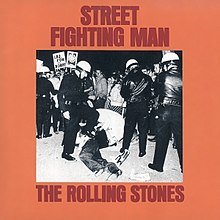
Back Street Fighting Man Danish Street Fighting Man German Street Fighting Man Spanish Street Fighting Man French Street Fighting Man Italian ストリート・ファイティング・マン Japanese Street Fighting Man Georgian Street Fighting Man Korean Street Fighting Man (Rolling Stones) Dutch Street Fighting Man NN
| "Street Fighting Man" | ||||
|---|---|---|---|---|
 | ||||
| Single by the Rolling Stones | ||||
| from the album Beggars Banquet | ||||
| B-side |
| |||
| Released |
| |||
| Recorded | April–May 1968 | |||
| Genre | ||||
| Length |
| |||
| Label | London | |||
| Songwriter(s) | Jagger–Richards | |||
| Producer(s) | Jimmy Miller | |||
| The Rolling Stones US singles chronology | ||||
| ||||
| Audio sample | ||||
| Alternative cover | ||||
 French single picture sleeve | ||||
"Street Fighting Man" is a song by the English rock band the Rolling Stones, written by the songwriting team of Mick Jagger and Keith Richards. Considered one of the band's most popular and most controversial songs, it features Indian instrumentation contributed by Brian Jones, which has led to it being characterized as a raga rock song. It also features controversial and ambiguous lyrics about armed revolution. In the United States, it was released as a single in August 1968, while it was not released in the United Kingdom until four months later on the Beggars Banquet album, where it opened side two. The B-side of the American single featured "No Expectations", considered one of the final Stones tracks in which founding member Jones played a significant role in its construction.
While "Street Fighting Man" was originally written with an entirely different set of lyrics, growing violence at political events throughout 1968 inspired Mick Jagger to alter the song to directly address such topics. With its release coming after a highly politically charged and publicized summer of violence, and the release of the Beatles' "Revolution", a song with similar themes, "Street Fighting Man" sparked controversy in the United States upon release, with many radio stations boycotting the song and refusing to play it. As a result of this, the song peaked only at number 48 on the Billboard Hot 100, after the previous Stones single "Jumpin' Jack Flash" reached the top three in America. "Street Fighting Man" thus became the lowest-charting Rolling Stones A-side since their American single debut "Not Fade Away", four years prior.
Despite the initial poor chart reception and controversy, "Street Fighting Man" was praised by the music press upon its release, and played a role in elevating the Rolling Stones' reputation as a culturally subversive group. Retrospectively, the song has been praised for its lyrics and production, and is viewed by some commentators as one of the greatest and most important songs of the 1960s. In 2004, Rolling Stone magazine ranked the song number 295 on its list of the 500 Greatest Songs of All Time, while Pitchfork ranked it the 62nd best song of the 1960s.
- ^ Milward, John (2013). Crossroads: How the Blues Shaped Rock 'n' Roll (and Rock Saved the Blues). Northeastern. p. 128. ISBN 978-1555537449.
- ^ Willis, Ellen (2011). Out of the Vinyl Deeps: Ellen Willis on Rock Music. University of Minnesota Press. p. 80. ISBN 978-0816672837.
- ^ Schaffner, Nicholas (1982). The British Invasion: From the First Wave to the New Wave. Mcgraw-Hill. p. 77. ISBN 978-0070550896.
© MMXXIII Rich X Search. We shall prevail. All rights reserved. Rich X Search